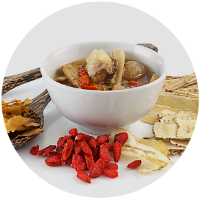Mindful Meals:
Nourishing Body and Spirit
In traditional Chinese culture, eating is not a separate act from healing—it is healing. Food is seen as a daily form of medicine, a way to maintain balance, strengthen the body, and calm the spirit. While modern nutrition often focuses on numbers—calories, fat, protein—Chinese dietary wisdom focuses on qualities: warming or cooling, moistening or drying, tonifying or clearing.
At the heart of this approach is intention. A mindful meal begins long before the first bite. It starts in the market, with a quiet awareness of what the body needs in that moment. It continues in the kitchen, where the act of chopping vegetables, simmering soup, or brewing tea becomes a calming ritual in itself.
Traditional Chinese medicine (TCM) places special importance on supporting the Spleen Qi, the energetic function associated with digestion. Warm, cooked foods—like rice, root vegetables, and broths—are preferred over raw or cold items, especially in cooler seasons or for those with weaker digestion. Simple dishes like congee, stir-fried greens with ginger, or black sesame soup may appear humble, but they carry deep healing value when prepared with care and eaten with attention.
Eating in a calm setting is equally important. TCM teaches that strong emotions, multitasking, or eating in a rush can interfere with the body’s ability to process food. Sitting down, breathing, and offering even a moment of quiet gratitude allows the Qi to flow more smoothly and the food to be more easily transformed into nourishment.
This doesn’t require perfection or elaborate rituals. A mindful meal might be as simple as a bowl of rice with steamed vegetables, enjoyed in peace. It might mean choosing seasonal produce that supports the body’s natural rhythms—cooling foods in summer, warming foods in winter. Or it might mean cooking for loved ones with an open heart, knowing that shared meals strengthen not only digestion, but connection.
In a world of busy schedules and endless diets, returning to the simplicity of mindful eating offers something quietly powerful. It brings us back into the body, into the present moment, and into a tradition that values harmony over control.
Eating this way is not about restriction—it’s about care. And that care begins, quite literally, at the table.
Vocabulary Guide
- Qi (气) – The vital energy that flows through the body. Balanced qi is essential for digestion, immunity, and overall vitality.
- Spleen qi (脾气 pí qì) – In Chinese medicine, the spleen governs digestion and transformation of food into energy. Weak spleen qi can lead to bloating, fatigue, and poor appetite.
- Dampness (湿 shī) – A term in TCM describing internal heaviness or sluggishness often caused by greasy, sweet, or raw foods. Dampness can affect digestion and mental clarity.
- Congee (粥 zhōu) – A soft rice porridge often eaten for breakfast or during illness. It is gentle on the digestion and can be flavored with herbs, vegetables, or meats.
- Mindful eating (正念饮食 zhèngniàn yǐnshí) – A modern phrase that mirrors traditional principles of eating with awareness, gratitude, and attention to how food affects the body and mind.







